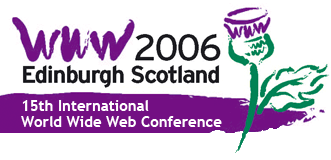Refereed Track: Security, privacy & Ethics
Viruses, spyware, and identity theft are turning the World Wide Web into a dangerous place. By undermining consumer trust, these problems are hampering e-commerce and the growth of online communities. A basic lesson is coming home to researchers, operators, and ordinary users alike: Security and privacy are not frills or features, but vital and enabling building blocks. As Web-based systems take on a physical dimension through wireless devices and sensors, and as they absorb varied media — from books to online games to home movies — digital security is ramifying in its economic and social reach.
This track promotes the view that security, privacy, and sound guiding ethics must be part of the texture of a successful World Wide Web. In addition to devising practical tools and techniques, it is the duty of the research community to promote and guide business adoption of security technology for the Web and to help inform related legislation.
The organizers seek novel research in security, privacy, and ethics as they relate to the Web, including but not limited to the following areas:
- Biometrics and secure template management
- Digital Rights Management from its technical, ethical, and legal perspectives
- Economic / business analysis of Web security and privacy
- Electronic commerce, particularly security mechanisms for e-cash, auctions, payment, and fraud detection
- Intrusion detection, insider threats, auditing, and honeypots
- Legal and legislative approaches to issues of Web security and privacy
- Location-based services
- Knowledge-based authentication, such as security questions for password recovery
- Privacy-enhancing technologies, including anonymity, pseudonymity and identity management
- Public-key infrastructure and supporting concepts like digital signatures and certification
- Secure and robust management of server farms
- User interfaces as they relate to digital signing, encryption, passwords, and online scams like phishing
- Wireless devices that interface with the Web, including RFID, sensors, and mobile phones
- Web-services and supporting standards like XML
Accepted Papers
Markus Jakobsson Sid Stamm Stefan Kals Engin Kirda Christopher Kruegel Nenad Jovanovic Markus Jakobsson Jacob Ratkiewicz Collin Jackson Andrew Bortz Dan Boneh John C Mitchell Chairs
PC Members
- Masayuki Abe (NTT, Japan)
- Kostas Anagnostakis (Univ. of Penn., USA)
- Dan Boneh (Stanford Univ., USA)
- Dario Catalano (l’ENS, France)
- Sabrina de Capitani di Vimercati (Univ. of Milan, Italy)
- Marc Dacier (Eurecom, France)
- George Danezis (Univ. Cambridge, UK)
- Ed Felten (Princeton Univ., USA)
- Kevin Fu (Univ. of Mass, USA)
- Craig Gentry (Stanford Univ., USA)
- Sotiris Ioannidis (Stevens Inst. of Tech., USA)
- Markus Jakobsson (Univ. of Indiana, USA)
- Marc Joye (Gemplus & CIM-PACA, France)
- Arjen Lenstra (Lucent, Bell Labs, USA and Tech. Univ. Eindhoven, The Netherlands)
- Radia Perlman (Sun Microsystems, USA)
- Benny Pinkas (HP Labs, USA)
- Mike Reiter (CMU, USA)
- Eric Rescorla (RTFM Inc., USA)
- Vitaly Shmatikov (UT Austin, USA)
- Jessica Staddon (PARC, USA)
- Dan Wallach (Rice Univ., USA)
- Brent Waters (Stanford Univ., USA)
- Rebecca Wright (Stevens Inst. of Tech, USA)
- Dongyan Xu (Purdue, Univ., USA)
- Yuliang Zheng (Univ. of North Carolina, USA)
|

